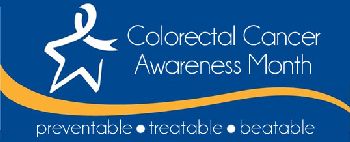March 12, 2013
 03/13/13 As winter marches into spring, some Hoosiers should consider marching into their health care provider for an all-important colorectal cancer screening. March is National Colorectal Cancer Awareness Month, a time which serves as a reminder that colorectal cancer is the third most commonly diagnosed cancer and cause of cancer-related death in Indiana.
03/13/13 As winter marches into spring, some Hoosiers should consider marching into their health care provider for an all-important colorectal cancer screening. March is National Colorectal Cancer Awareness Month, a time which serves as a reminder that colorectal cancer is the third most commonly diagnosed cancer and cause of cancer-related death in Indiana.
In 2011, the American Cancer Society estimated that 3,290 Hoosiers were diagnosed with colorectal cancer and 1,090 died as a result of the disease. According to the Indiana Cancer Facts and Figures 2012 report, gender and age are the two greatest risk factors for developing colorectal cancer. From 2005 to 2009, colorectal cancer incidence rates were 34 percent higher among Indiana males than females. In addition, during 2009, 91 percent of colorectal cancer cases were diagnosed among Hoosiers age 50 or older.
Colorectal cancer screening critical for early detection. According to the Centers for Disease Control and Prevention, up to 60 percent of deaths from colorectal cancer could be prevented with regular screenings.
“I know firsthand the tragedy of losing a loved one to colon cancer. We lost my father to it,” said State Health Commissioner William VanNess, M.D. “If you’re 50 or older, this message is for you—talk to your physician about which screening option is best for you and make your appointment. If undetected, colorectal cancer is often fatal. Screening provides your best chance for detecting problems early when treatment is most effective.”
The United States Preventive Services Task Force recommends colorectal cancer screening for men and women ages 50 to 75 using high-sensitivity fecal occult blood testing (FOBT), sigmoidoscopy or colonoscopy. The frequencies for screening tests include:
Individuals who have an increased risk for colorectal cancer should talk to their health care provider about whether earlier or more intensive screening is needed.
Medicare and most insurance plans help pay for colorectal cancer screening. The public can also call 1-800-4-CANCER (1-800-227-2345) to learn more about screening options in their community.
In addition to regular screenings, Hoosiers can reduce their colorectal cancer risk by:
“Many lives can be saved each year by improving our routines to lead an overall healthy lifestyle, including eating more fruits and vegetables, incorporating exercise into the day, quitting tobacco and, of course, following the recommended cancer screening guidelines,” said Dr. VanNess.
To learn more about colorectal cancer, please refer to the Indiana Cancer Facts and Figures 2012, a comprehensive report on the burden of cancer in Indiana at http://indianacancer.org/.
Those interested in impacting the burden of cancer in Indiana should consider participating in the Indiana Cancer Consortium (ICC). The ICC is a statewide network of partnerships whose mission is to reduce the cancer burden in Indiana through the development, implementation and evaluation of a comprehensive plan that addresses cancer across the continuum from prevention through palliation. Participation in the ICC is open to all organizations and individuals interested in cancer prevention, early detection, treatment, quality of life, data collection and advocacy regarding cancer-related issues.